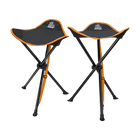PWM Solar Charge Controllers: Everything You Need to Know

If you power your home with solar energy, then investing in a quality solar controller is necessary. They play a critical role in keeping your system efficient and effective throughout all different kinds of weather.
One of the most popular solar controller options is a pulse width modulation controller or PWM. This article will cover everything you need to know about PWM controllers and the alternatives to help you decide whether it’s right for you.
Let’s get started.
- Why do you need a solar controller?
- What is a PWM solar controller?
- The Advantages of a PWM Solar Controller
- The Downsides of a PWM Solar Charge Controller
- Differences Between a PWM and MPPT Controller
- Should You Choose a PWM or MPPT Solar Charge Controller?
- FAQ
- BougeRV Has the Perfect PWM Solar Charge Controller For Your Needs
Why do you need a solar controller?
Solar controllers play a key role in keeping your solar batteries operational for longer. They prevent your batteries from being overcharged and stop them from unnecessarily discharging the solar energy you’ve accumulated during the night.
If you used solar energy without a charge controller, your system would still function. But you’d end up getting much less usable electricity out of it. This is because much of the power that you generate would be lost in the process of storing and retrieving it from your solar battery.
What is a PWM solar controller?

A PWM solar controller is one category of solar charge controller. PWM is an acronym that stands for pulse-width modulation, which is the kind of technology that these controllers use to achieve their function.
PWM controllers reduce current flows gradually to regulate the flow of energy that your solar batteries receive. They also supply a small amount of power continuously to keep the batteries full for as long as possible.
The Advantages of a PWM Solar Controller

Now that we know what a PWM solar controller is and why people use them let’s take a look at what advantages PWM units have over some of the alternatives.
Here are three key benefits to using this kind of solar charge controller that you should be aware of before making a purchasing decision.
They’re Highly Affordable
Compared to the alternatives, PWM charge controllers are exceptionally affordable. You can typically purchase them for around $60 to $100 (or even less).
This makes it extremely easy to get the solar charge controller you need for your system without having to break your budget to do so. If affordability is your main concern, then a PWM controller is a great option.
Longer Lifespan
PWM charge controllers tend to be simpler than the alternatives. They have fewer components that can break in them. This means that they tend to have longer lifespans than things like MPPT charge controllers.
Of course, your individual experience with a PWM controller can always vary. But as a general rule of thumb, these are both easier to maintain and should last longer than your other major options.
Perfect for Certain Types of Solar Power Systems
PWM solar charge controllers are also perfect for certain kinds of solar energy setups.
For example, if you have a small system on a tiny home or an RV, then they’re going to provide you with everything that you need at a much lower price point than an MPPT controller.
Similarly, if you live in an area that receives mostly sunny weather year-round, then a PWM should be good enough for your system. We’ll provide more details on why that’s true in the following section.
The Downsides of a PWM Solar Charge Controller

Here are two drawbacks that are worth thinking about.
Less Efficient
PWM solar charge controllers are less efficient than their main competition, MPPT charge controllers. This means that you won’t get as much usable energy out of your solar panels if you opt for a PWM controller
That being said, the efficiency dip you get from choosing one of these controllers can be large or small.
The energy drop-off will typically be larger if you live in an area with normal seasons than it would be if you live in something like a desert environment where you receive year-round sun.
Not a Good Fit for Larger, Complex Systems
When you use a PWM solar charge controller, your battery and solar panels need to have matching voltages. This may not always be the case in larger, complex systems.
That’s why some people only recommend PWM controllers for simple solar panel arrays.
Differences Between a PWM and MPPT Controller
The headline difference between a PWM and MPPT controller is that the PWM is affordable and less efficient, whereas the MPPT is expensive and more efficient.
This has to do with the different kinds of technology that each type of controller uses to achieve its goals. MPPT controllers are more advanced, using monitoring and adjustments to constantly regulate your solar system’s current.
An MPPT controller can step down the voltage, boost their current, and gradually limit their output to ensure that your batteries always receive the optimal levels of charge.
Should You Choose a PWM or MPPT Solar Charge Controller?
Both PWM and MPPT solar charge controllers can be viable options for different solar panel owners. So which one should you select?
Here are three questions to ask yourself as you make that decision.
What’s your weather like?
The climate that your solar panels exist in can have a big impact on which kind of solar charge controller is right for you.
As we touched on earlier, PWM controllers tend to do better in environments with year-round sun. If you live somewhere like this, the drop-off in efficiency that you get from PWM panels could be negligible.
MPPT controllers, on the other hand, deliver a lot of value to homes situated in climates with traditional weather. This is because they do better at conserving energy in different weather conditions.
How important is pricing to you?
MPPT controllers are better technical products than PWM controllers full-stop. The only reason to choose a PWM charge controller is if you want to save money, which is absolutely a valid reason to make a decision.
But if pricing isn’t that important to you, and you just want what’s best for your system, an MPPT controller will be a better buy.
Are you good at maintenance?
MPPT controllers feature more components than PWM solar charge controllers. This means you need to be more proactive about maintaining an MPPT controller.
If you know that you’re not very good at maintenance, then choosing a PWM controller may be a better option.
FAQ
What’s a PWM solar charge controller?
A pulse-width modulation (PWM) controller helps to regulate the flow of energy to your solar battery to enhance the efficiency of your solar energy system.
Do I need a solar charge controller?
Yes, you need a solar charge controller in order to use your solar panels with enough efficiency to make them worthwhile.
How much should a PWM solar charge controller cost?
You should typically expect to pay between $60 and $100 to purchase a PWM solar charge controller, but some companies, like BougeRV, have them available for less.
BougeRV Has the Perfect PWM Solar Charge Controller For Your Needs

If you think that a PWM controller is what’s best for your home system, BougeRV has you covered. We offer a wide variety of solar controllers to choose from. Take a look at our website to learn more about what your options are.



















































































































































































































